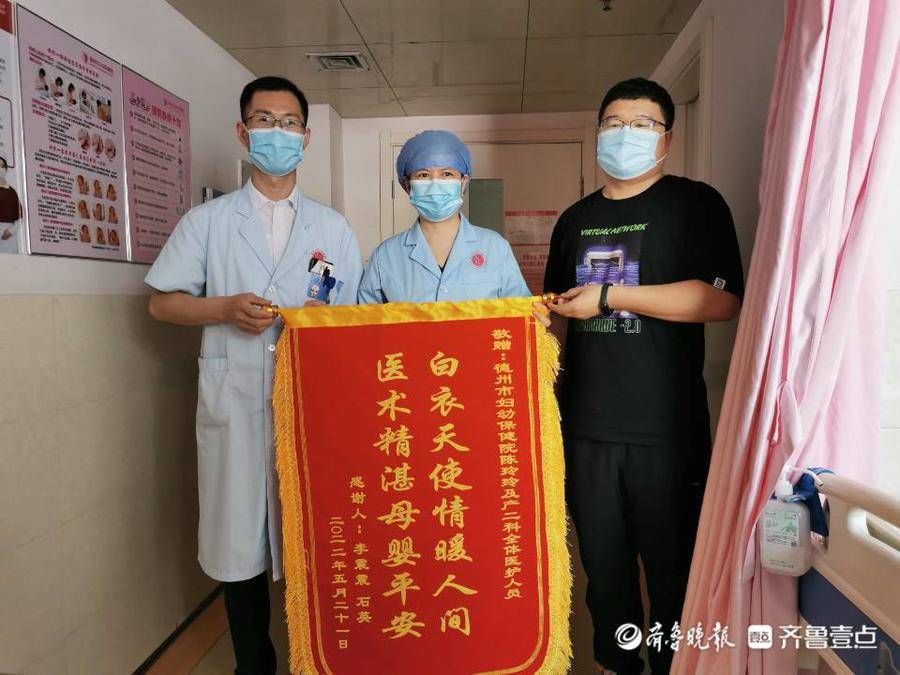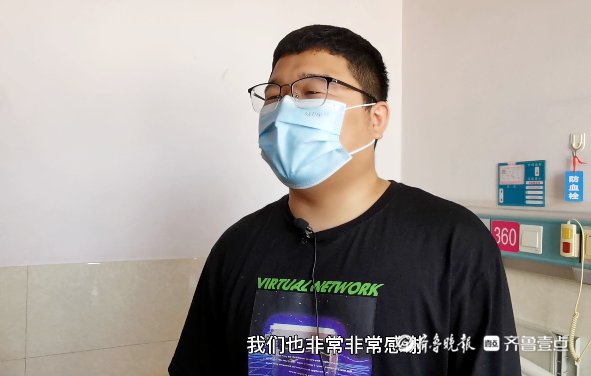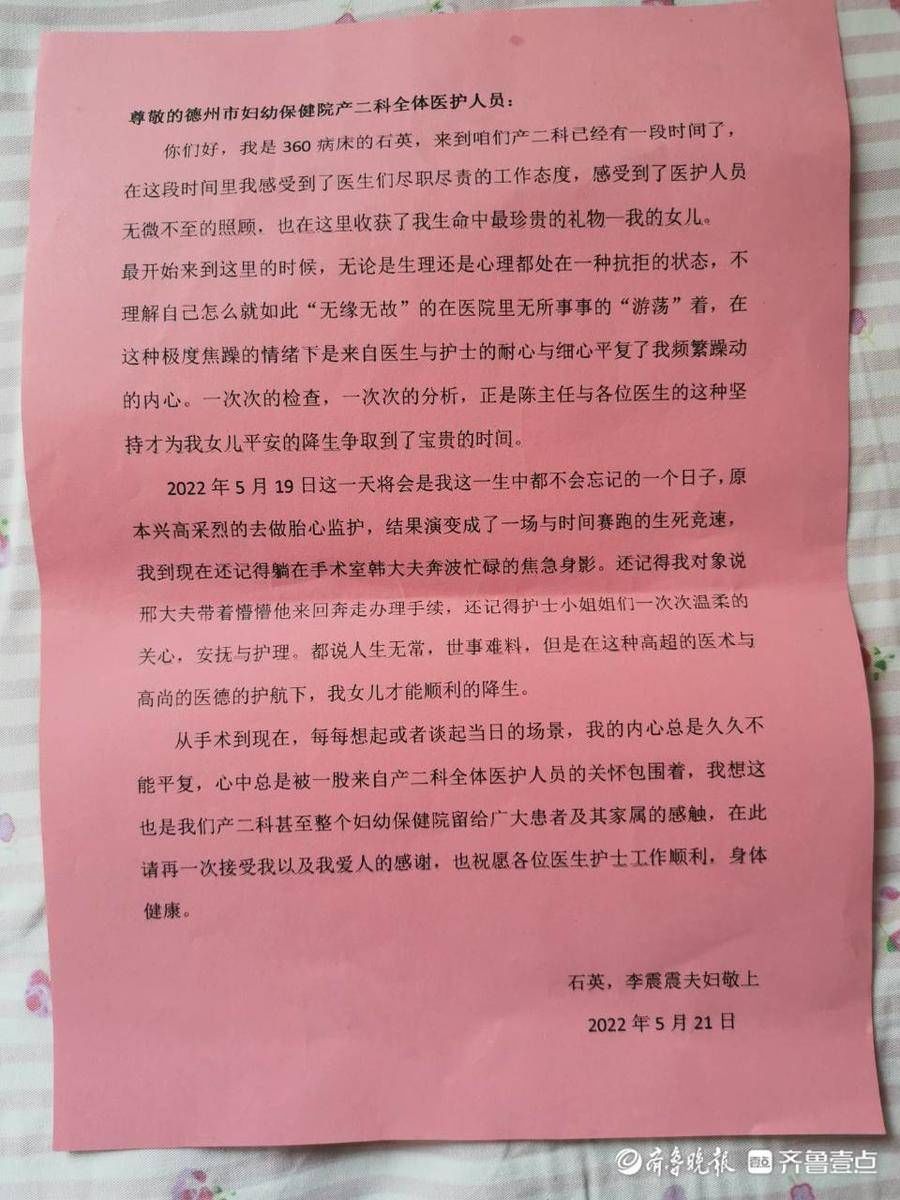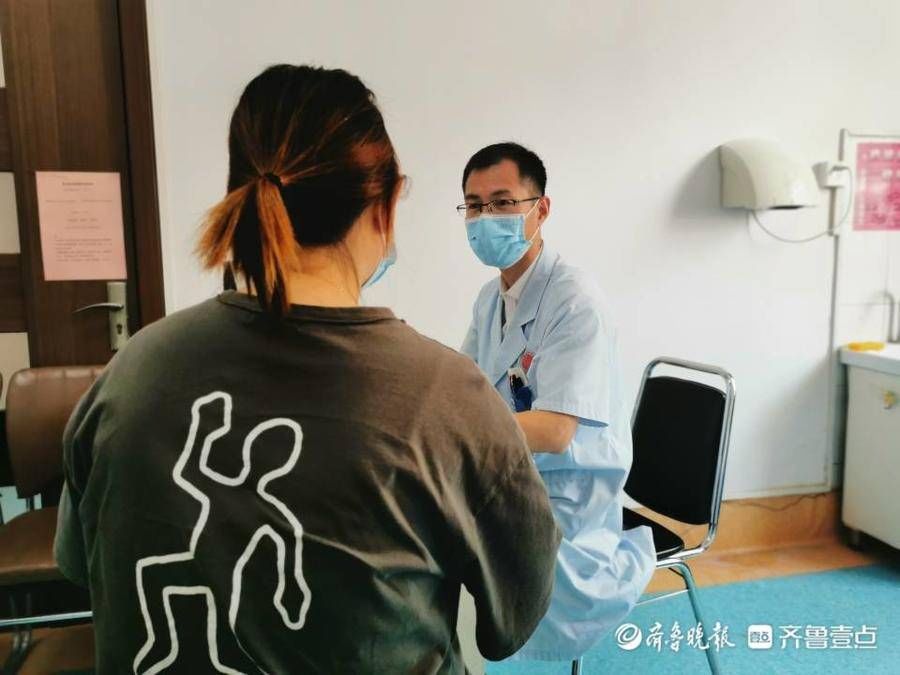Reporter Ma Xueping
“Thank you Director Xu and Dr. Han, thanks to your efforts to ensure the safety of our mother and daughter.” On May 23, Ms. Shi and her family will A pennant was handed to Chen Lingling, deputy director of the Obstetrics Department of Dezhou Maternal and Child Health Hospital, and Han Peiyin, deputy chief physician, thanking the medical staff for their timely and effective treatment, allowing the mother and daughter to survive the dangerous placental abruption.

Ms. Shi, 31, was admitted to hospital on May 13 due to “32+1 week of menopause and positive urine protein”. “The typical features of this pregnant woman are her age, obvious edema of her lower extremities for nearly half a month, and positive urine protein. Although her blood pressure has not reached the standard for diagnosing gestational hypertension, her fetal heart rate monitoring cannot be perfect every time.” Han Peiyin introduced, according to Because of the symptoms of pregnant women, he considered that she might have hidden preeclampsia, so after admission, the obstetric medical staff closely monitored Ms. Shi’s physical indicators and fetal heart rate.
“My blood pressure is not up to the standard of hypertension, and I have no discomfort, so why keep me in the hospital?” A few days before the hospitalization, Ms. Shi did not understand Dr. Han’s arrangement. She always wanted to leave the hospital. For this reason, Han Peiyin patiently explained to Ms. Shi, “Although your blood pressure is at the critical value, your urine protein is abnormal, and the fetal heart rate monitoring is not up to the standard. Placental abruption or fetal death in the womb.” In the end, Ms. Shi followed Han Peiyin’s advice and was hospitalized for observation.
On the evening of May 19, when Han Peiyin was working the night shift, Ms. Shi’s fetal heart rate was obviously abnormal, and the fetal heart rate was only about 100 beats. Later, it was confirmed by emergency B-ultrasound that the fetal heart rate was only 80-100 beats. /Min, Han Peiyin suspected that Ms. Shi had placental abruption, and decided to perform a cesarean section on the spot.
A series of actions were performed almost simultaneously, including reassuring pregnant women, contacting ultrasound, pre-operative conversation, issuing doctor’s orders, and informing the pediatrics… a series of actions were carried out almost simultaneously. , It only took 13 minutes from preparation to surgery, and the baby was delivered 2 minutes later. Afterwards, the chief pediatrician Feng Jinghan led the neonatal rescue team to take over the baby weighing about 1,500 grams for initial resuscitation. After timely, standardized and efficient treatment, the baby’s vital signs were stable. Maternal and neonatal recovery is currently good.
“I am still very excited when I look back on the scene at that time. The medical staff did their best for the safety of my wife and children. The scene of them flying to the operating room moved me very much.” Ms. Shi’s husband, Li said Mr.


The successful treatment benefited from the strong emergency response capability of the obstetrics team of Dezhou Maternal and Child Health Hospital With frequent and standardized emergency drills, the team has “whistleblowers” who find problems, decision makers at the last minute, executors who eliminate problems, and fresh troops who follow orders. In the face of emergency incidents, all the medical staff in the department can be called upon, able to fight, and able to win the battle. During the rescue process, the division of labor among team members is clear, standardized and efficient.

Han Peiyin introduced that gestational hypertension refers to a group of diseases with elevated blood pressure during pregnancy, including gestational hypertension, preeclampsia , eclampsia and pregnancy with chronic hypertension and chronic hypertension complicated by preeclampsia, are common obstetric diseases. The clinical manifestations of this group of diseases are diverse, including elevated blood pressure, proteinuria, edema, multiple organ damage, and in severe cases, convulsions (eclampsia), coma, etc. one of the main reasons. The daily management of pregnant women focuses on rest, diet, weight control and smoking cessation. For high-risk groups, moderate exercise, reasonable diet, calcium supplementation, and indicated application of low-dose aspirin during pregnancy can reduce the risk of the disease.
In addition, pregnant women should maintain a healthy and regular diet to ensure a comprehensive and balanced nutrition. An appropriate low-salt diet is recommended during pregnancy; moderate physical activity, such as walking, is performed every day to control blood pressure. If a pregnant woman has headache, dizziness, palpitation, suffocation or rapid weight gain recently, please go to a regular hospital to find a professional doctor for further examination.